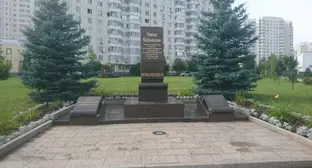
24 December 2018, 14:33
Monument to Turkish soldiers in Dagestan reminds about controversial aspects of civil war
Residents of Kumyk villages near Makhachkala have erected a monument to the soldiers of the Ottoman Empire, who 100 years ago drove troops of General Lazar Bicherakhov out of Dagestan. Locals associate General's soldiers with violence and perceive their Turk counterparts as liberators; however, historians have no common opinion on whether the actions of the Ottoman Empire in Northern Caucasus were intervention.
The memorial sign is dedicated to the Ottoman soldiers who perished on November 5-7, 1918, in the battles for the liberation of Port-Petrovsk, or Anzhikala (now Makhachkala; Anzhikala is an outdated Kumyk name of the city, – note of the "Caucasian Knot"). The initiators of the monument indicate that the Caucasian Islamic Army liberated the city and the adjacent Kumyk villages from the troops of General Bicherakhov (a representative of the White Movement, Major General of the British Army, an Ossetian, Lazar Bicherakhov, – note of the "Caucasian Knot"). In their turn, critics of the initiative see anti-Russian sentiments in it – they treat Turkish soldiers as interventionists who fought against the troops of the "Russian officer" Bicherakhov.
The opening of the memorial sign is an expression of local residents' gratitude to the people who saved them from violence, said Ruslan Salakhbekov, the head of the Moscow-based public organization of Kumyks named "Kumuklar".
In the opinion of Vadim Mukhanov, a historian, Turks made use of the religious factor and declared their intention to stop killings of Muslims in Transcaucasia.
According to his story, the actions of the Caucasian Islamic Army had affected the hostile relations of Azerbaijanis and Armenians.
This article was originally published on the Russian page of 24/7 Internet agency ‘Caucasian Knot’ on December 23, 2018 at 09:29 pm MSK. To access the full text of the article, click here.
Author: Rustam Djalilov Source: CK correspondent




